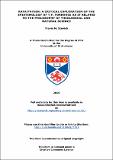Files in this item
Kata physin : a critical exploration of the epistemology of T. F. Torrance as it relates to the philosophy of theological and natural science
Item metadata
| dc.contributor.advisor | Torrance, Alan J. | |
| dc.contributor.author | Stevick, Travis M. | |
| dc.coverage.spatial | 228 | en_US |
| dc.date.accessioned | 2015-11-16T15:26:12Z | |
| dc.date.available | 2015-11-16T15:26:12Z | |
| dc.date.issued | 2015-11-30 | |
| dc.identifier | uk.bl.ethos.675204 | |
| dc.identifier.uri | https://hdl.handle.net/10023/7791 | |
| dc.description.abstract | According to T. F. Torrance, all authentic knowledge involves the nature of the object impressing its inherent rationality on our minds. Consequently, knowledge involves thinking in accordance with the nature of the object given for thought. Given that this epistemological position is not presuppositionless, we shall explore the place and function of "ultimate beliefs" in Torrance's epistemology, as well as the question as to whether such beliefs imply a retreat to either foundationalism or fideism. The inescapability of ultimate beliefs in all human knowledge requires a shift in the traditional notion of objectivity. Consequently Torrance's understanding of objectivity, and the reasons for his insistence that the subject-object relation cannot be transcended, are analyzed. Additionally, our ability to keep our tendency toward subjectivity in check is considered. It is also argued that Torrance's epistemological position implies an alternative notion of truth. Drawing on distinctly Christian sources, Torrance emphasizes the distinction between truth and truthfulness thereby reorienting the discussion from a focus on statements to a focus on being. This shift challenges the dichotomy between correspondence and coherence theories of truth and provides one way of transcending the scientific realism/anti-realism debate. Torrance's position on truth is located relative to other well-known thinkers. Torrance's epistemological convictions give rise to a practical epistemological tool, disclosure models. These function as self-correcting, self-marginalizing lenses through which we encounter reality, allowing it to disclose itself to us. It is this constant disclosure and revision that enables our concepts to remain rooted in reality and yield knowledge in accordance to the nature of the thing known. | en_US |
| dc.language.iso | en | en_US |
| dc.publisher | University of St Andrews | |
| dc.rights | Creative Commons Attribution-NoDerivatives 4.0 International | |
| dc.rights.uri | http://creativecommons.org/licenses/by-nd/4.0/ | |
| dc.subject | Torrance | en_US |
| dc.subject | Epistemology | en_US |
| dc.subject.lcc | BX4827.T67S8 | |
| dc.subject.lcsh | Torrance, Thomas F. (Thomas Forsyth), 1913-2007 | en_US |
| dc.subject.lcsh | Knowledge, Theory of | en_US |
| dc.title | Kata physin : a critical exploration of the epistemology of T. F. Torrance as it relates to the philosophy of theological and natural science | en_US |
| dc.type | Thesis | en_US |
| dc.type.qualificationlevel | Doctoral | en_US |
| dc.type.qualificationname | PhD Doctor of Philosophy | en_US |
| dc.publisher.institution | The University of St Andrews | en_US |
This item appears in the following Collection(s)
Except where otherwise noted within the work, this item's licence for re-use is described as Creative Commons Attribution-NoDerivatives 4.0 International
Items in the St Andrews Research Repository are protected by copyright, with all rights reserved, unless otherwise indicated.


